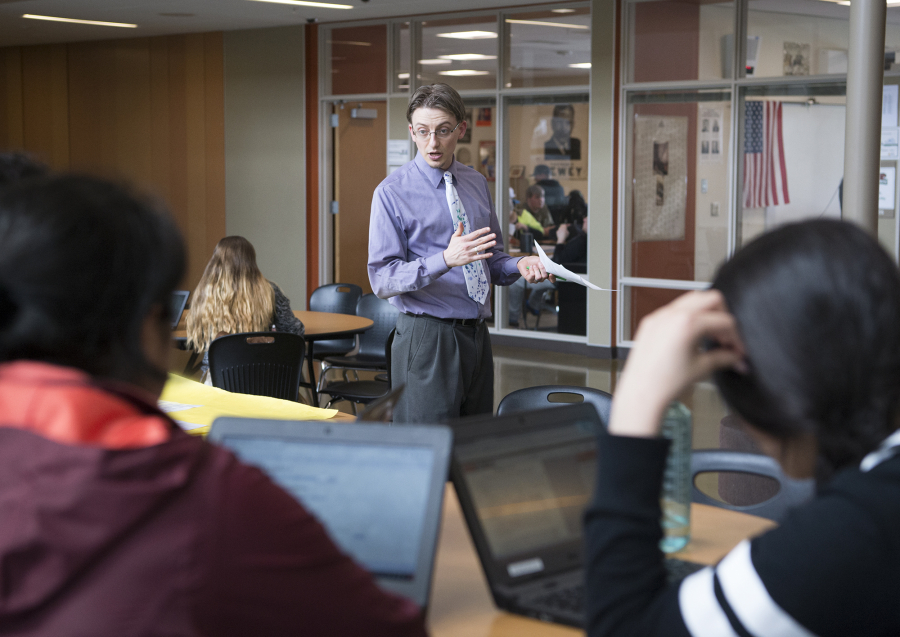WOODLAND — It took Ole Warndahl about three months to feel comfortable in his ninth-grade language arts class.
For Michael Dunn, it took roughly the entire first semester.
What threw the two of them off wasn’t transitioning to high school or the complexities of “The Odyssey.” What made them uncomfortable was that their teacher, Jason Cowley, decided to go gradeless this year.
“It felt weird,” Warndahl, 14, said. “I’ve never done it before. It’s something new. After Mr. Cowley explained it for three months, I got it.”
Starting this school year, Cowley, and Aaron Blackwelder, the two language arts teachers for freshmen at Woodland High School, decided to stop giving out letter grades to their students.
Now, the two teachers go through common core standards with their students, give them assignments and homework and, instead of doling out letter grades or point totals, they meet with them individually to give them feedback.
“It’s a lot more individual conferencing, tutoring and student-led discussions,” said Cowley, 35. “It’s less stand and deliver teaching. It’s doing fewer things on a deeper level.”
They tell students what they did well and what can be improved upon to meet the level of proficiency that was set for the assignment. If the student doesn’t meet the level of proficiency, he or she can revise the assignment until it does.
“They have to be proficient in everything,” Blackwelder, 45, said. “The standards are a lot higher than they used to be. The way we used to do things, what does a B mean? If a student writes an essay with proper spelling and grammar, but no analysis? Or is it the opposite? This way, the assignment is incomplete until it’s proficient.”
The students are usually working on multiple assignments at a time.
“You have more freedom to do whatever you choose,” Warndahl said. “There are more options to pursue things that interest you.”
During the first semester, Blackwelder was teaching his students about character development. After they read “The Odyssey,” he asked students to make a project based on character development, and he had a student create a board game. Other times, if a student was struggling with an assignment and didn’t reach the proficiency level after a few attempts, the teachers will tell the student to go write an essay and come up with a presentation on something that interested them, which led to one student giving a presentation on how Flamin’ Hot Cheetos are made.
“The content is the conduit to teach skills,” Blackwelder said. “Can a kid be successful 20 years from now without knowing ‘Romeo and Juliet’? Probably. Can a kid be successful 20 years from now without knowing how to format an argument? Less likely.”
For Blackwelder and Cowley, going gradeless is as much about preparing students for present-day life as it is about emphasizing learning.
“The traditional model of education came from the factory model,” Blackwelder said. “We don’t really have that many factories anymore. Creativity and ideas are our main commodity right now. We need to teach students to be motivated and self-driven.”
Blackwelder and Cowley were both hired at Woodland 11 years ago and started talking about how to promote learning more about a year ago. Cowley wrote his master’s project at Washington State University Vancouver on de-emphasizing grading. His project started as an idea on how to make grades more reflective on learning. He didn’t see a way other than getting rid of grading altogether.
The gradeless class is still a work in progress, Cowley said. Neither teacher has received negative feedback on the idea from any students or parents, nor has Principal John Shoup.
“People are always going to want the empirical evidence,” he said. “The evidence is going to be the test scores, which doesn’t happen until the spring. The anecdotal evidence I have from talking to 15 to 20 kids in their classes is they are supportive of the idea. They find it very empowering to be in charge of their own learning.”
Shoup said the two are excellent teachers who have the students’ best interest in mind, so he had no issue with letting them go gradeless.
“It’s like music or sports, where you get feedback all the time,” he said. “You’re not thinking about grades, you’re just thinking about getting better and taking the feedback to heart. It’s giving constant feedback without the risk or fear kids have of messing up their grades.”
Students focusing on their grades more than the material was a big reason Blackwelder started looking at different teaching methods.
“The high-performing kids were just concentrating on points instead of what they could do better,” he said. “If a kid got a 94 on a test, it became an argument over those six points. And kids that started out slow, they’d give up by January thinking there was no way to bring their grade up.”
The teachers are required to give the students grades at the end of each semester, but in Blackwelder’s and Cowley’s classes, the students have to tell the teachers what grades they think they deserve and argue their case. Warndahl and Dunn both said they felt they deserved an A and both students received A’s.
Both teachers plan on doing this again next year, and Cowley said he plans on bringing it to his 10th-grade classes. Shoup said he’s had other staff members reach out about trying it, and there has been discussions about how to bring the practice into other subjects.
“I can never go back,” Blackwelder said. “School can be about learning or achievement. Grades are achievement. Learning is unquantifiable. You can’t put learning into numbers.”




